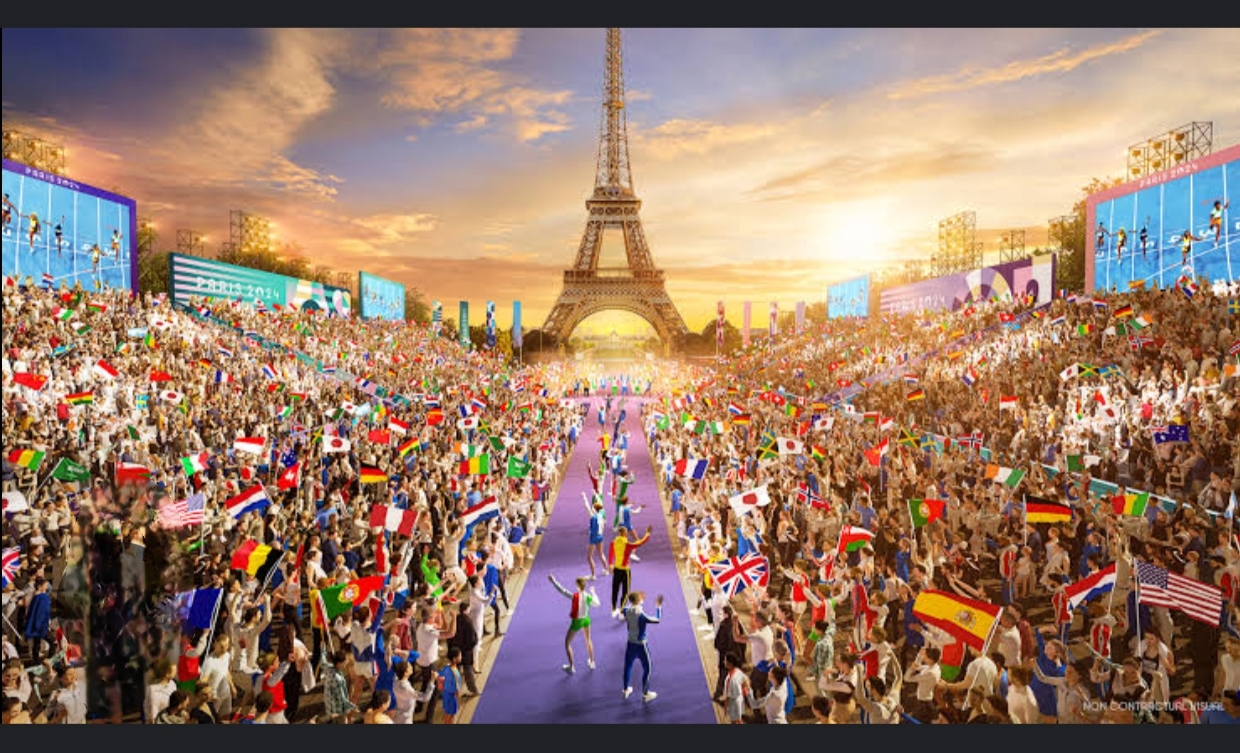Blog Credit : Trupti Thakur
Image Courtesy : Google
Paris Olympics 2024
The 2024 Summer Olympics, officially the Games of the XXXIII Olympiad and branded as Paris 2024, were an international multi-sport event that occurred from 24 July to 11 August 2024 in France, with the opening ceremony having taken place on 26 July. Paris was the host city, with events (mainly football) held in 16 additional cities spread across Metropolitan France, including the sailing centre in the second-largest city of France, Marseille on the Mediterranean Sea, and one subsite for surfing in Tahiti, French Polynesia.
Paris was awarded the Games at the 131st IOC Session in Lima, Peru, on 13 September 2017. After multiple withdrawals that left only Paris and Los Angeles in contention, the International Olympic Committee (IOC) approved a process to concurrently award the 2024 and 2028 Summer Olympics to the two remaining candidate cities; both of the bids were praised for high technical plans and innovative ways to use a record-breaking number of existing and temporary facilities. Having previously hosted in 1900 and 1924, Paris became the second city ever to host the Summer Olympics three times (after London, which hosted the games in 1908, 1948, and 2012). Paris 2024 marked the centenary of Paris 1924 and Chamonix 1924 (the first Winter Olympics), as well as the sixth Olympic Games hosted by France (three Summer Olympics and three Winter Olympics) and the first with this distinction since the 1992 Winter Games in Albertville. The Summer Games returned to the traditional four-year Olympiad cycle, after the 2020 edition was postponed to 2021 due to the COVID-19 pandemic.
Paris 2024 featured the debut of breakdancing as an Olympic sport, and was the final Olympic Games held during the IOC presidency of Thomas Bach. The 2024 Games were expected to cost €9 billion.
The United States topped the medal table with 40 gold medals and 126 medals in total. Tied in terms of gold medals, China finished second, with 40 gold medals and 91 medals overall. This is also the first time that there has ever been a tie in gold medals at the top of the table in Summer Olympic history. Japan finished third with 20 gold medals and sixth in the overall medal count. Australia finished fourth with 18 gold medals and fifth in the overall medal count. The host nation, France, finished fifth with 16 gold and 64 total medals.
Dominica, Saint Lucia, Cape Verde, and Albania won their first-ever Olympic medals, the former two both being gold, with Botswana and Guatemala also winning their first-ever gold medals. The Refugee Olympic Team also won their first-ever medal in boxing.
Host selection
Having previously hosted the 1900 and 1924 games, Paris did not host the games until when they bid for the 1992 games but lost to Barcelona. They also failed to bid for the 2008 and 2012 games, which were held in Beijing and London.
The six candidate cities were Paris, Hamburg, Boston, Budapest, Rome, and Los Angeles. The bidding process was slowed by withdrawals, political uncertainty, and deterring costs. Boston surpassed Los Angeles, San Francisco, and Washington, DC, in the official U.S. bid. On 27 July 2015, Boston and the USOC mutually agreed to terminate Boston’s bid to host the Games, partly because of mixed feelings in the city of Boston. Hamburg withdrew its bid on 29 November 2015 after holding a referendum. Rome withdrew on 21 September 2016, citing fiscal difficulties. Budapest withdrew on 22 February 2017, after a petition against the bid collected more signatures than necessary for a referendum.
Following these withdrawals, the IOC Executive Board met on 9 June 2017 in Lausanne, Switzerland, to discuss the 2024 and 2028 bid processes. The International Olympic Committee formally proposed electing the 2024 and 2028 Olympic host cities at the same time in 2017, a proposal which an Extraordinary IOC Session approved on 11 July 2017 in Lausanne. The IOC set up a process whereby the LA 2024 and Paris 2024 bid committees met with the IOC to discuss which city would host the Games in 2024 and 2028 and whether it was possible to select the host cities for both at the same time.
Following the decision to award the two games simultaneously, Paris was understood to be the preferred host for 2024. On 31 July 2017, the IOC announced Los Angeles as the sole candidate for 2028, enabling Paris to be confirmed as host for 2024. Both decisions were ratified at the 131st IOC Session on 13 September 2017.
Host city election
Paris was elected as the host city on 13 September 2017 at the 131st IOC Session in Lima, Peru. The two French IOC members, Guy Drut and Tony Estanguet, were ineligible to vote under the rules of the Olympic Charter.
2024 Summer Olympics
bidding resultsCity Nation Votes Paris France Selected as 2024 host Los Angeles United States Selected as 2028 host Hamburg Germany Withdrew Rome Italy Budapest Hungary Development and preparations
Venues
Most of the Olympic events are being held in the city of Paris and its metropolitan region, including the neighbouring cities of Saint-Denis, Le Bourget, Nanterre, Versailles, and Vaires-sur-Marne.
The basketball preliminaries and handball finals will be held in Lille, which is 225 km (140 mi) from the host city, Paris; the sailing and some of the football games will be held in the Mediterranean city of Marseille, which is 777 km (483 mi) from Paris; meanwhile, the surfing events are expected to be held in Teahupo’o village in the overseas territory of French Polynesia, which is 15,716 km (9,765 mi) from Paris. Football will also be hosted in an additional five cities: Bordeaux, Décines-Charpieu (Lyon), Nantes, Nice and Saint-Étienne, some of which are home to Ligue 1 clubs.
Grand Paris zone
Medals
President of the Paris 2024 Olympic Organizing Committee, Tony Estanguet, unveiled the Olympic and Paralympic medals for the Games in February 2024, which on the obverse featured embedded hexagon-shaped tokens of scrap iron that had been taken from the original construction of the Eiffel Tower, with the Games logo engraved into it. Approximately 5,084 medals would be produced by the French mint Monnaie de Paris, and were designed by Chaumet, a luxury jewellery firm based in Paris.
The reverse of the medals features Nike, the Greek goddess of victory, inside the Panathenaic Stadium which hosted the first modern Olympics in 1896. Parthenon and the Eiffel Tower can also be seen in the background on both sides of the medal. Each medal weighs 455–529 g (16–19 oz), has a diameter of 85 mm (3.3 in) and is 9.2 mm (0.36 in) thick. The gold medals are made with 98.8 percent silver and 1.13 percent gold, while the bronze medals are made up with copper, zinc, and tin.
Security
France reached an agreement with Europol and the UK Home Office to help strengthen security and “facilitate operational information exchange and international law enforcement cooperation” during the Games. The agreement included a plan to deploy more drones and sea barriers to prevent small boats from crossing the Channel illegally. The British Army would also provide support by deploying Starstreak surface-to-air missile units for air security. To prepare for the Games, the Paris police held inspections and rehearsals in their bomb disposal unit, similar to their preparations for the 2023 Rugby World Cup at the Stade de France.
As part of a visit to France by Qatari Emir Sheikh Tamim bin Hamad Al-Thani, several agreements were signed between the two nations to enhance security for the Olympics.[41] In preparation for the significant security demands and counterterrorism measures, Poland pledged to contribute security troops, including sniffer dog handlers, to support international efforts aimed at ensuring the safety of the Games. The Qatari Minister of Interior and Commander of Lekhwiya (the Qatari security forces) convened a meeting on 3 April 2024 to discuss security operations ahead of the Olympics, with officials and security leaders in attendance, including Nasser Al-Khelaifi and Sheikh Jassim bin Mansour Al Thani. A week before the opening ceremony, the Lekhwiya were reported to have been deployed in Paris on 16 July 2024.
Security concerns impacted the plans that had been announced for the opening ceremony, which was to take place as a public event along the Seine; the expected attendance was reduced by half from an estimated 600,000 to 300,000, with plans for free viewing locations now being by invitation only. In April 2024, after Islamic State claimed responsibility for the Crocus City Hall attack in March, and made several threats against the UEFA Champions League quarter-finals, French president Emmanuel Macron indicated that the opening ceremony could be scaled back or re-located if necessary. French authorities had placed roughly 75,000 police and military officials on the streets of Paris in the lead-up to the Games.
Food
To reduce the environmental impact and climate footprint of the Paris 2024 Games, the Olympic venues will serve twice as much plant-based food as was available in London in 2012 and Rio in 2016. Vegan chicken nuggets and vegan hot dogs will be provided, rather than the meat-based variety, in a bid to make 30% of the menu plant-based.
An estimated 13 million meals will be served at the Games; with around 40,000 meals each day, 1,200 of those will be Michelin-starred. Each day, a boulangerie will bake fresh baguettes and other breads.
A 3,500-seat restaurant was constructed for the Games to highlight global cuisine. Great Britain’s team asked for porridge to be added to the menu, and South Korea’s team asked for kimchi.
Throughout the Games, athletes and competitors at the Olympic Village complained about a lack of certain foods within the accommodation, such as eggs and grilled meats. As well as being in short supply, meat was also reportedly served raw. As a result of the ongoing food issues, many athletes have begun to avoid the Olympic Village dining facilities and eat elsewhere, while some nations have flown in chefs and food supplies for their delegations. Great Britain’s Olympic Team brought in chefs to prepare food for the British athletes at a location outside the Olympic Village.
Air conditioning
In the lead-up to the Games, it was announced that the Olympic Village would lack air conditioning; as an environmental measure, the buildings would instead use a geothermal natural cooling system to keep the inside temperature 6 °C (11 °F) cooler than outside.[94] On learning this, many teams opted to supply their own air-conditioning units to the Games, including Canada, Great Britain, Italy, Germany, Greece, Denmark, and Japan. Olympic delegations from poorer countries, such as Uganda, complained that they could not afford to provide air conditioning for their athletes.
Transportation
Over €500 million has been invested in transport improvements for the Games, with extensions to the Paris Métro and 60 kilometres (37 mi) of new cycle lanes. Visitors to Paris will pay higher public transport fares during the Games, €4 instead of the previous €2.15 price. This will pay for the increased frequency and hours of service for public transport during the Games, with an average increase of 15% in services. As with previous Games, 185 kilometres (115 mi) of reserved traffic lanes will be used to ensure reliable journey times for athletes, officials and the media.
Volunteers
The Paris 2024 volunteer platform for the Olympic and Paralympic Games was opened to the public in March 2023. There were expected to be 45,000 volunteers recruited worldwide for the Games. Following the end of registration on 3 May 2023, over 300,000 applications had been submitted to the Paris Organising Committee, exceeding the number of applicants for the previous two Olympics. Applicants were notified of the outcome of their application between September and December 2023. Over 800 applicants were excluded over security fears, among which 15 were flagged with Fiche S
Torch relay
The Olympic torch relay began with the lighting of the Olympic flame on 16 April in Olympia, Greece, 100 days before the start of the Games. Greek rower Stefanos Douskos was the first torchbearer and swimmer Laure Manaudou served as the first French torchbearer.The latter was selected to be one of four captains of the torch relay, alongside swimmer Florent Manaudou (her brother), paratriathlete Mona Francis [fr], and para-athlete Dimitri Pavadé. The torch relay is expected to have 10,000 torchbearers and visit over 400 settlements in 65 French territories, including six overseas. On 18 May, it was reported that the portion of the relay in New Caledonia was cancelled due to ongoing unrest in the collectivity.
The Games
Opening ceremony
The opening ceremony began at 19:30 CEST (17:30 GMT) on 26 July 2024. Directed by Thomas Jolly, it was the first Summer Olympics opening ceremony to be held outside the traditional stadium setting; the parade of athletes was conducted as a boat parade along the Seine from Pont d’Austerlitz to Pont d’Iéna, and cultural segments took place at various landmarks along the route. Jolly stated that the ceremony would highlight notable moments in the history of France, with an overall theme of love and “shared humanity”. The athletes then attended the official protocol at Jardins du Trocadéro, in front of the Eiffel Tower. Approximately 326,000 tickets were sold for viewing locations along the Seine, 222,000 of which were distributed primarily to the Games’ volunteers, youth and low-income families, among others.
The ceremony featured music performances by American musician Lady Gaga, French-Malian singer Aya Nakamura, heavy metal band Gojira and soprano Marina Viotti [fr], Axelle Saint-Cirel (who sang the French national anthem “La Marseillaise” atop the Grand Palais), rapper Rim’K, Philippe Katerine (who portrayed the Greek god Dionysus), Juliette Armanet and Sofiane Pamart, and was closed by Canadian singer Céline Dion. The Games were formally opened by president Emmanuel Macron. The Olympic cauldron, which was lit by Guadeloupean judoka Teddy Riner and sprinter Marie-José Pérec, has a hot air balloon-inspired design topped by a 30-metre-tall (98 ft) helium sphere; it is allowed to float into the air above the Tuileries Garden at night. For the first time, the cauldron is not illuminated through combustion; the flames are simulated by an LED lighting system and aerosol water jets.
Controversy ensued at the opening ceremony when a segment was thought to parody the Last Supper. The organisers apologised for any offence caused. The Olympic flag was also raised upside down.
Sports
The programme of the 2024 Summer Olympics featured 329 events in 32 sports, encompassing a total of 48 disciplines. This included the 28 “core” Olympic sports contested in 2016 and 2020, and 4 optional sports that were proposed by the Paris Organising Committee: breakdancing made its Olympic debut as an optional sport, while skateboarding, sport climbing, and surfing returned to the programme, having debuted at the 2020 Summer Olympics. Four events were dropped from weightlifting. In canoeing, two sprint events were replaced with two slalom events, keeping the overall event total at 16. In sport climbing, the previous “combined” event was divided into two separate disciplines: speed climbing, and boulder-and-lead.
- Aquatics
- Artistic swimming (2)
- Diving (8)
- Marathon swimming (2)
- Swimming (35)
- Water polo (2)
- Archery (5)
- Athletics (48)
- Badminton (5)
- Basketball
- Basketball (2)
- 3×3 basketball (2)
- Boxing (13)
- Breaking (2)
- Canoeing
- Slalom (6)
- Sprint (10)
- Cycling
- BMX freestyle (2)
- BMX racing (2)
- Mountain biking (2)
- Road (4)
- Track (12)
- Equestrian
- Dressage (2)
- Eventing (2)
- Jumping (2)
- Fencing (12)
- Field hockey (2)
- Football (2)
- Golf (2)
- Gymnastics
- Artistic (14)
- Rhythmic (2)
- Trampoline (2)
- Handball (2)
- Judo (15)
- Modern pentathlon (2)
- Rowing (14)
- Rugby sevens (2)
- Sailing (10)
- Shooting (15)
- Skateboarding (4)
- Sport climbing (4)
- Surfing (2)
- Table tennis (5)
- Taekwondo (8)
- Tennis (5)
- Triathlon (3)
- Volleyball
- Volleyball (2)
- Beach volleyball (2)
- Weightlifting (10)
- Wrestling
- Freestyle (12)
- Greco-Roman (6)
New and optional sports
When Paris was bidding for the Games in August 2017, the Paris Organising Committee announced an intention to hold talks with the IOC and professional esports organisations about the possibility of introducing competitive esports events in 2024. In July 2018, the IOC confirmed that esports would not be considered for the 2024 Olympics. At the 134th IOC Session in June 2019, the IOC approved the Paris Organising Committee’s proposed optional sports of breaking (breakdance), along with skateboarding, sport climbing, and surfing, three sports that were first included in 2020.
In the 2024 Paris Olympics, several new events and formats have been introduced. Formula Kite makes its debut, described as the “Formula One of the Olympics,” featuring high-speed foil racing with separate events for men and women. Kayak cross also debuts, where four athletes race against each other on a course with multiple gates, marking the first head-to-head race in Olympic canoe slalom history. Sport climbing returns with a new format, splitting into bouldering and lead combined events in addition to a speed event. 3×3 basketball, which debuted in Tokyo, is back with finals scheduled for August 5 at Place de La Concorde. Changes in other sports include the introduction of men’s participation in artistic swimming, a new women’s weight class in boxing, and the addition of a marathon race walk mixed relay in track and field.
Medal reallocations from previous Olympics
In addition, Champions Park also hosted medal reallocations from previous Olympics dating back as far as Sydney in 2000. One medal reallocation that took place on 7 August was that for the team figure skating event at the 2022 Winter Olympics in Beijing, which had been the first Olympic medal ceremony to be delayed or postponed after Kamila Valieva from original gold medalist Russia was reported and then confirmed to have tested positive in 2021 for trimetazidine. In January 2024, the Court of Arbitration for Sport disqualified Valieva for four years retroactive to 25 December 2021 for an anti-doping rule violation, and the International Skating Union subsequently subtracted Valieva’s scores, which upgraded the United States and Japan to gold and silver respectively.
Under the IOC’s Medal Reallocation Rules, the IOC, the ISU, and the national committees for both the United States and Japan coordinated the medal ceremony for gold and silver medals during reallocation ceremonies during the Paris Olympics. Beijing 2022 music was still used for the medal ceremony, but both teams wore Paris 2024 tracksuits and it was the first medal ceremony from the 2022 Winter Olympics to have a full crowd, as there had been reduced audiences in 2022 due to the COVID-19 pandemic.
Closing ceremony
The closing ceremony was held at Stade de France on 11 August 2024. Titled “Records”, the ceremony was themed around a dystopian future, where the Olympic Games have disappeared, and a group of space people will reinvent it. It featured more than a hundred performers, including acrobats, dancers and circus artists.[144] Tom Cruise also appeared with Red Hot Chili Peppers, Billie Eilish, Snoop Dogg, and H.E.R. performing during the “LA28 Handover Celebration” portion of the ceremony. The Antwerp Ceremony, in which the Olympic flag was handed to Los Angeles, the host city of the 2028 Summer Olympics, was produced by Ben Winston and his studio Fulwell 73.
Participating National Olympic Committees
204 out of 206 National Olympic Committees are represented at the 2024 Summer Games with 54 from Africa, 48 from Europe, 44 from Asia, 41 from the Americas and 17 from Oceania. North Korea returned to the Games in 2024 after missing the 2020 edition. Following the Russian invasion of Ukraine, the IOC suspended the Olympic Committees of Russia and Belarus for violating the Olympic Truce. Russian and Belarusian athletes instead competed as “Individual Neutral Athletes” (AIN) without national identification, as long as they did not “actively” support the war. Individual neutral athletes had to be approved by each sport’s international federation, and then the IOC’s panel. As individual athletes, AIN was not considered a delegation during the opening ceremony or in the medal tables. The Refugee Olympic Team also competed.
Blog By : Trupti Thakur

12
AugParis Olympics 2024
Aug 12, 2024Recent Blog
Quantum Gravity Gradiometer PathFinderApr 28, 2025
The TechKriti 2025Apr 26, 2025
India’s First Quantum Computing VillageApr 24, 2025
India’s Achievement In QKDApr 22, 2025
The V2G TechnologyApr 21, 2025




